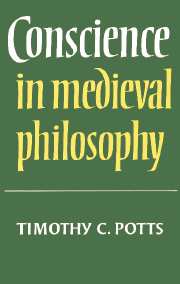Book contents
- Frontmatter
- Contents
- Preface
- Glossary
- 1 Peter Lombard and Jerome
- 2 Philip the Chancellor
- 3 Bonaventure
- 4 Aquinas
- 5 Balance-sheet
- TRANSLATIONS
- Notes on the translations
- Jerome, Commentary on Ezekiel 1.7
- Augustine, On the Trinity, book 12 (excerpts)
- Peter Lombard, Books of Judgements 2.39
- Philip the Chancellor, Summa de bono, treatise on conscience
- Bonaventure, Commentary on Peter Lombard's Books of ‘Judgements’ 2.39
- Aquinas, Debated Questions on Truth 16–17
- APPENDICES
- Bibliography
- Analytical index of subjects
- Index of proper names
- Index of Biblical references
Peter Lombard, Books of Judgements 2.39
Published online by Cambridge University Press: 06 January 2010
- Frontmatter
- Contents
- Preface
- Glossary
- 1 Peter Lombard and Jerome
- 2 Philip the Chancellor
- 3 Bonaventure
- 4 Aquinas
- 5 Balance-sheet
- TRANSLATIONS
- Notes on the translations
- Jerome, Commentary on Ezekiel 1.7
- Augustine, On the Trinity, book 12 (excerpts)
- Peter Lombard, Books of Judgements 2.39
- Philip the Chancellor, Summa de bono, treatise on conscience
- Bonaventure, Commentary on Peter Lombard's Books of ‘Judgements’ 2.39
- Aquinas, Debated Questions on Truth 16–17
- APPENDICES
- Bibliography
- Analytical index of subjects
- Index of proper names
- Index of Biblical references
Summary
Peter was born near Novara, educated at Bologna, Rheims and the school of St Victor, and was probably also a pupil of Abelard. He taught in the cathedral school of Paris from 1140 until he became bishop of Paris in 1159. He wrote the first theological text-book, called the Sententiae (Judgements), published in the early 1150s. It consisted of a series of questions on which arguments on both sides were given from Scripture, the Councils and the Fathers (taken from earlier anthologies), and then, usually, his own judgement on the issue. The Sententiae quickly became established as the standard theology text, after the Bible, in the new universities, and over two hundred commentaries were written upon it. The question translated below, though concerned with the will rather than conscience, contains a reference to the passage from Jerome's Commentary on Ezekiel translated above, and thus became the source of the medieval treatises on conscience; most of them are commentaries upon this question.
BOOKS OF JUDGEMENTS 2.39
(Latin text in Magistri Petri Lombardi Sententiae in IV libros distinctae, tom. i, pars ii. Grottaferrata (Rome), Collegium S. Bonaventurae Ad Claras Aquas (Quaracchi), 1971, pp. 553–556.)
- Type
- Chapter
- Information
- Conscience in Medieval Philosophy , pp. 90 - 93Publisher: Cambridge University PressPrint publication year: 1980



